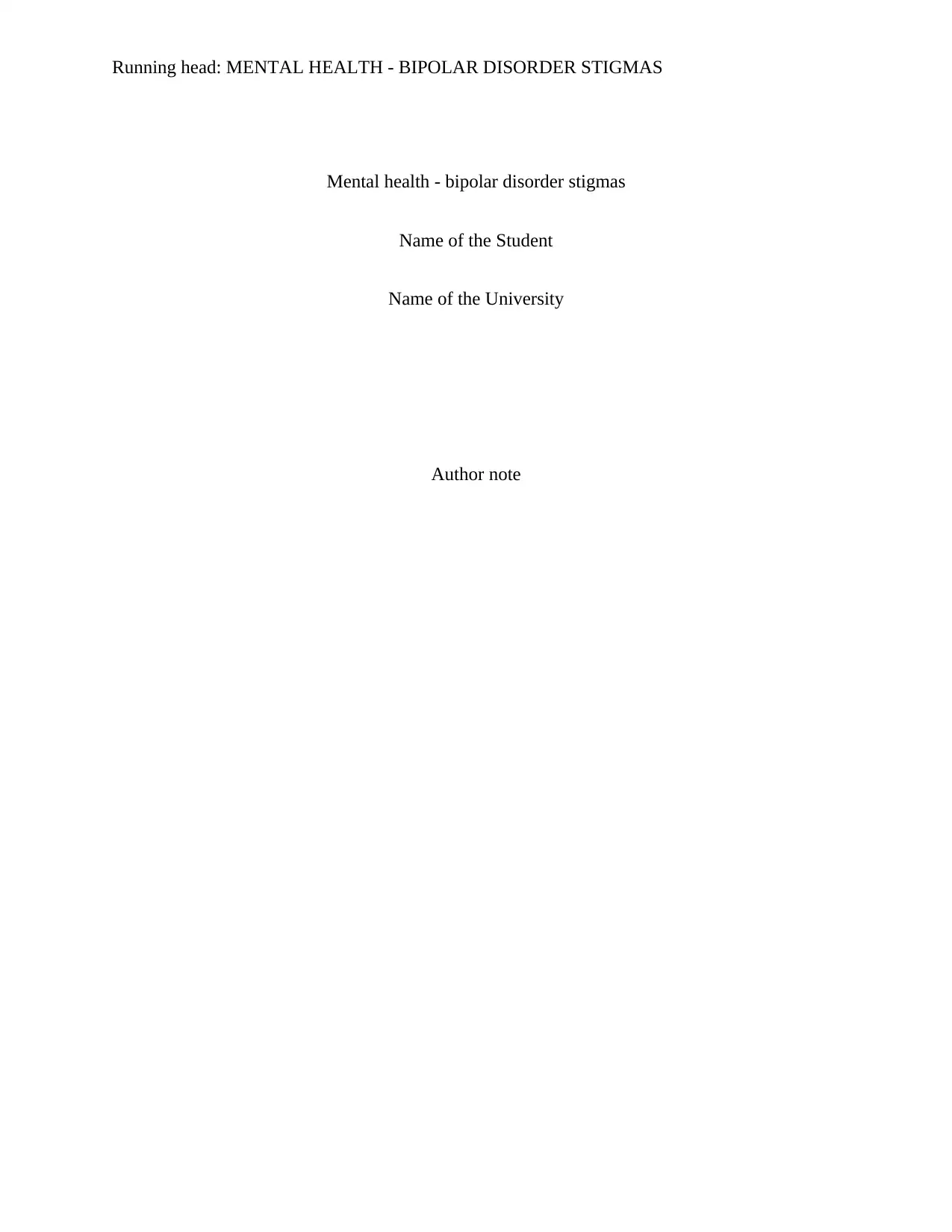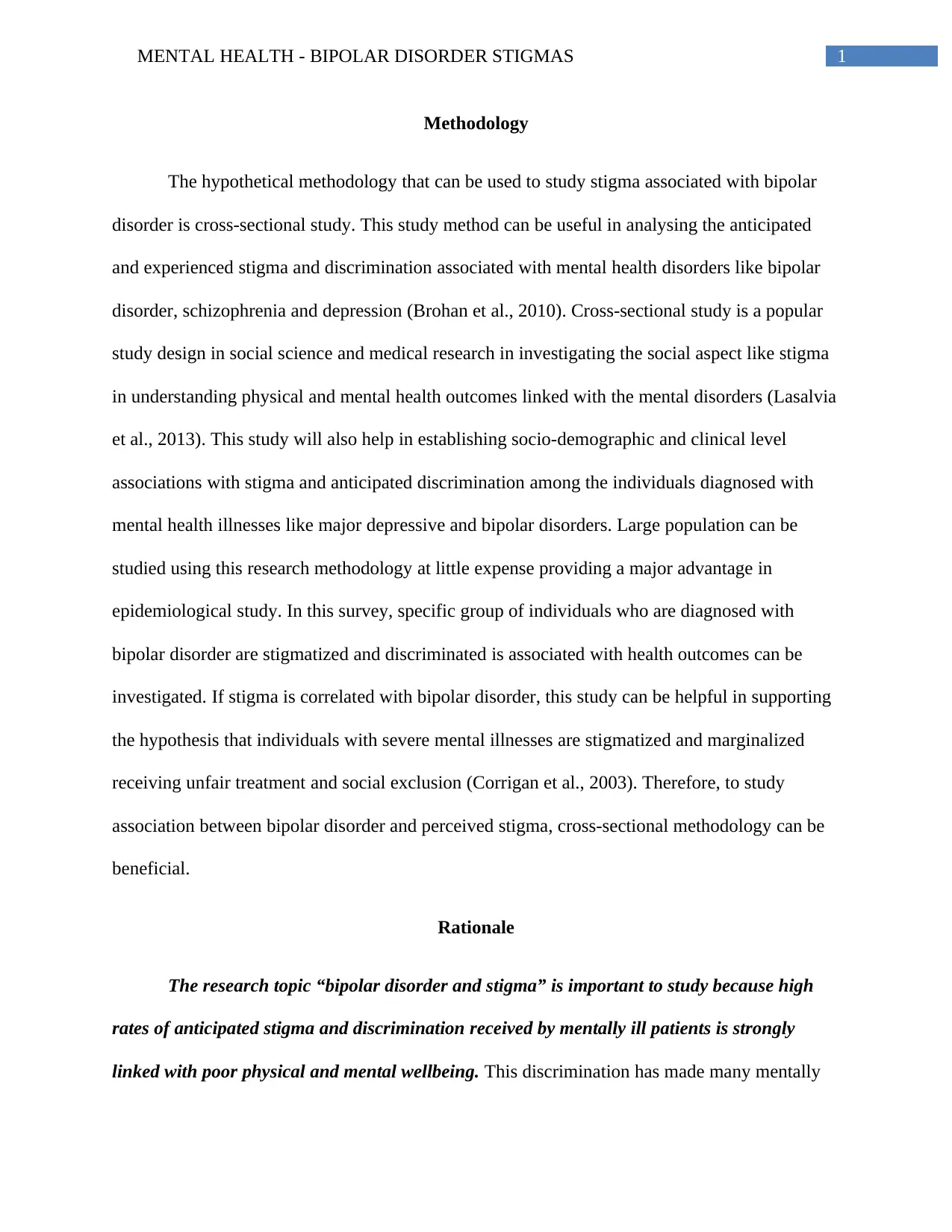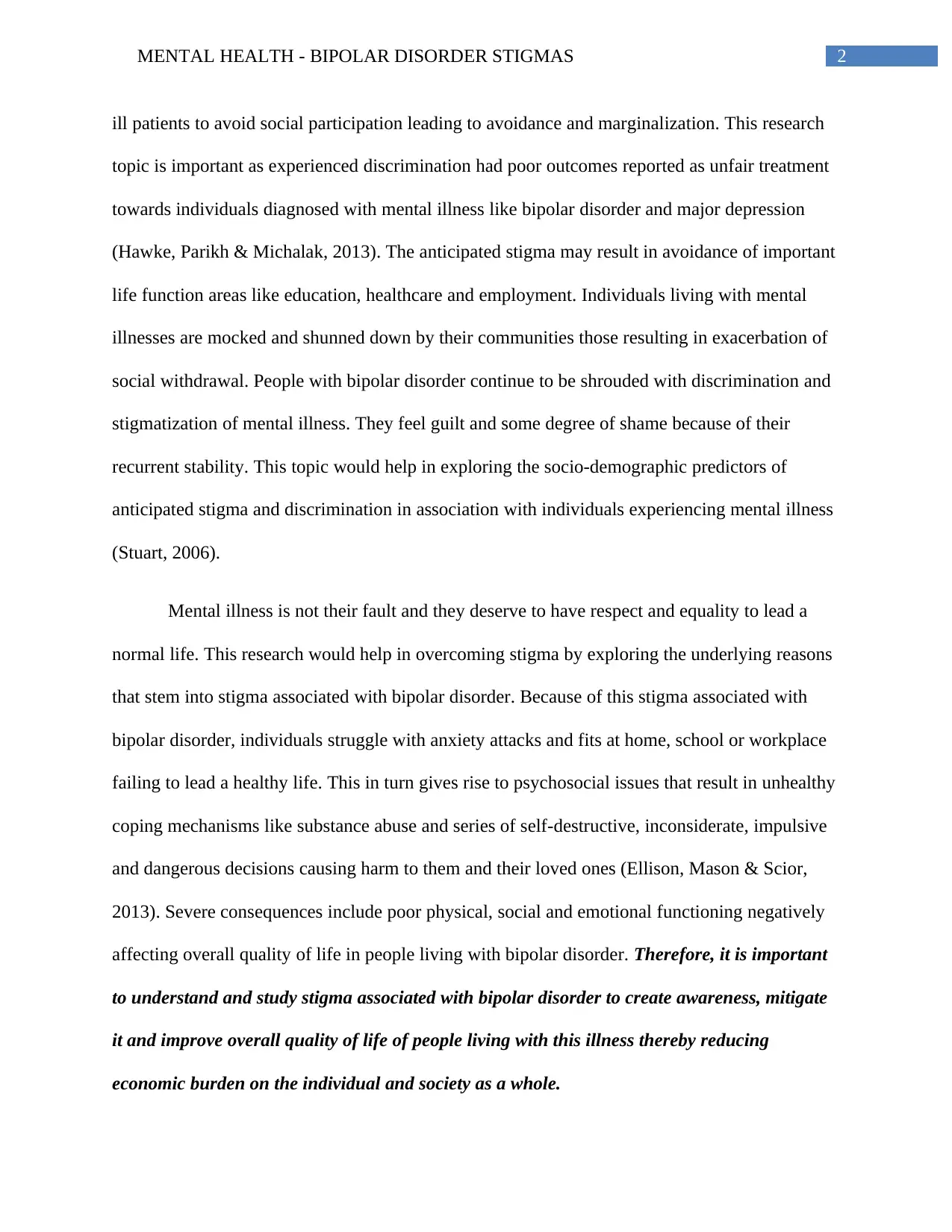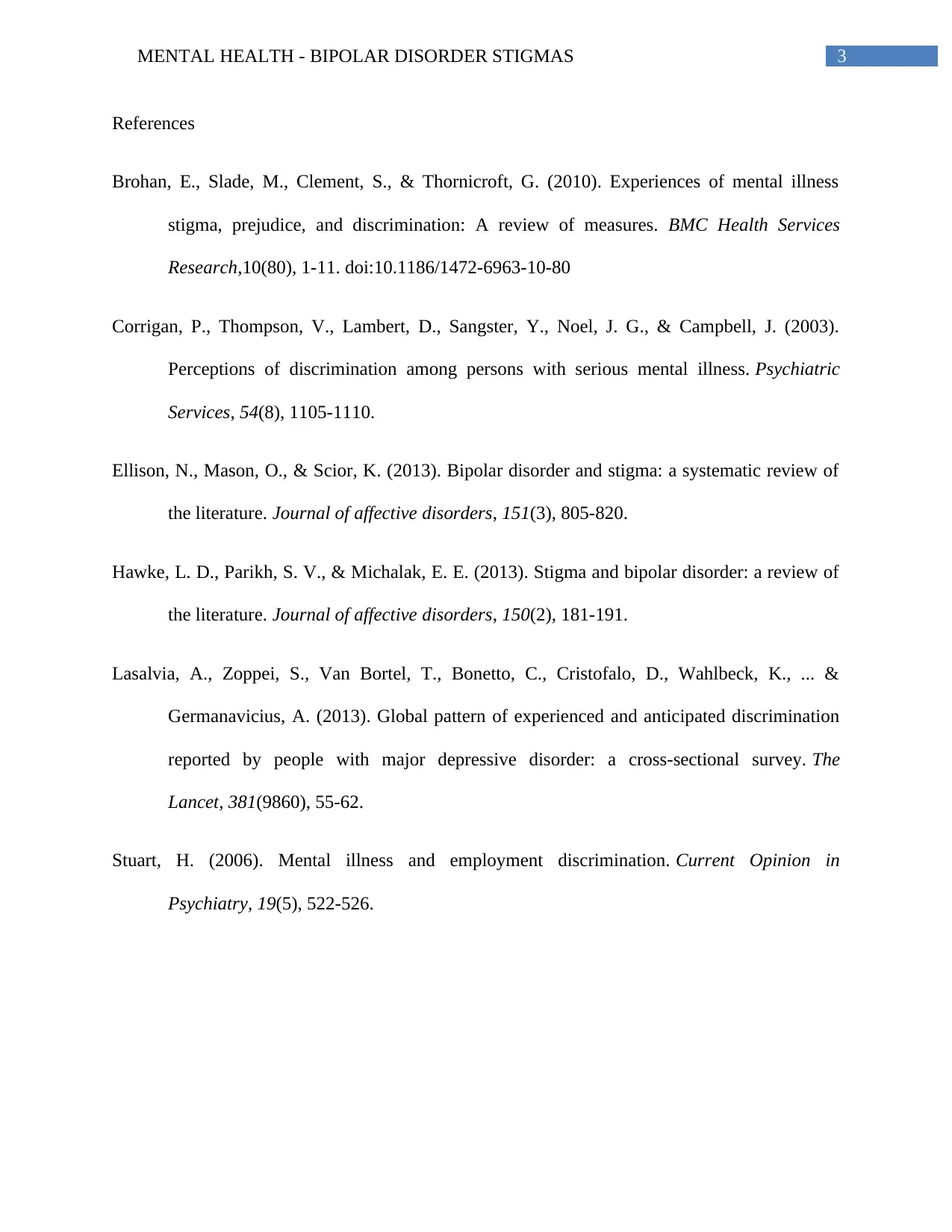Research Report: Methodology & Rationale for Studying Bipolar Stigma
VerifiedAdded on 2023/06/10
|4
|919
|111
Report
AI Summary
This report outlines a cross-sectional study methodology for investigating the stigma associated with bipolar disorder, emphasizing its impact on mental health outcomes. The rationale underscores the importance of studying this topic due to the high rates of anticipated stigma and discrimination faced by individuals with bipolar disorder, which can lead to poor physical and mental well-being, social avoidance, and marginalization. The research aims to explore socio-demographic predictors of stigma and discrimination, highlighting that mental illness is not a fault and that individuals deserve respect and equality. Addressing stigma can mitigate anxiety, improve coping mechanisms, and enhance the overall quality of life for people living with bipolar disorder, ultimately reducing the economic burden on individuals and society. Desklib provides access to this document and many other study resources.

Running head: MENTAL HEALTH - BIPOLAR DISORDER STIGMAS
Mental health - bipolar disorder stigmas
Name of the Student
Name of the University
Author note
Mental health - bipolar disorder stigmas
Name of the Student
Name of the University
Author note
Paraphrase This Document
Need a fresh take? Get an instant paraphrase of this document with our AI Paraphraser

1MENTAL HEALTH - BIPOLAR DISORDER STIGMAS
Methodology
The hypothetical methodology that can be used to study stigma associated with bipolar
disorder is cross-sectional study. This study method can be useful in analysing the anticipated
and experienced stigma and discrimination associated with mental health disorders like bipolar
disorder, schizophrenia and depression (Brohan et al., 2010). Cross-sectional study is a popular
study design in social science and medical research in investigating the social aspect like stigma
in understanding physical and mental health outcomes linked with the mental disorders (Lasalvia
et al., 2013). This study will also help in establishing socio-demographic and clinical level
associations with stigma and anticipated discrimination among the individuals diagnosed with
mental health illnesses like major depressive and bipolar disorders. Large population can be
studied using this research methodology at little expense providing a major advantage in
epidemiological study. In this survey, specific group of individuals who are diagnosed with
bipolar disorder are stigmatized and discriminated is associated with health outcomes can be
investigated. If stigma is correlated with bipolar disorder, this study can be helpful in supporting
the hypothesis that individuals with severe mental illnesses are stigmatized and marginalized
receiving unfair treatment and social exclusion (Corrigan et al., 2003). Therefore, to study
association between bipolar disorder and perceived stigma, cross-sectional methodology can be
beneficial.
Rationale
The research topic “bipolar disorder and stigma” is important to study because high
rates of anticipated stigma and discrimination received by mentally ill patients is strongly
linked with poor physical and mental wellbeing. This discrimination has made many mentally
Methodology
The hypothetical methodology that can be used to study stigma associated with bipolar
disorder is cross-sectional study. This study method can be useful in analysing the anticipated
and experienced stigma and discrimination associated with mental health disorders like bipolar
disorder, schizophrenia and depression (Brohan et al., 2010). Cross-sectional study is a popular
study design in social science and medical research in investigating the social aspect like stigma
in understanding physical and mental health outcomes linked with the mental disorders (Lasalvia
et al., 2013). This study will also help in establishing socio-demographic and clinical level
associations with stigma and anticipated discrimination among the individuals diagnosed with
mental health illnesses like major depressive and bipolar disorders. Large population can be
studied using this research methodology at little expense providing a major advantage in
epidemiological study. In this survey, specific group of individuals who are diagnosed with
bipolar disorder are stigmatized and discriminated is associated with health outcomes can be
investigated. If stigma is correlated with bipolar disorder, this study can be helpful in supporting
the hypothesis that individuals with severe mental illnesses are stigmatized and marginalized
receiving unfair treatment and social exclusion (Corrigan et al., 2003). Therefore, to study
association between bipolar disorder and perceived stigma, cross-sectional methodology can be
beneficial.
Rationale
The research topic “bipolar disorder and stigma” is important to study because high
rates of anticipated stigma and discrimination received by mentally ill patients is strongly
linked with poor physical and mental wellbeing. This discrimination has made many mentally

2MENTAL HEALTH - BIPOLAR DISORDER STIGMAS
ill patients to avoid social participation leading to avoidance and marginalization. This research
topic is important as experienced discrimination had poor outcomes reported as unfair treatment
towards individuals diagnosed with mental illness like bipolar disorder and major depression
(Hawke, Parikh & Michalak, 2013). The anticipated stigma may result in avoidance of important
life function areas like education, healthcare and employment. Individuals living with mental
illnesses are mocked and shunned down by their communities those resulting in exacerbation of
social withdrawal. People with bipolar disorder continue to be shrouded with discrimination and
stigmatization of mental illness. They feel guilt and some degree of shame because of their
recurrent stability. This topic would help in exploring the socio-demographic predictors of
anticipated stigma and discrimination in association with individuals experiencing mental illness
(Stuart, 2006).
Mental illness is not their fault and they deserve to have respect and equality to lead a
normal life. This research would help in overcoming stigma by exploring the underlying reasons
that stem into stigma associated with bipolar disorder. Because of this stigma associated with
bipolar disorder, individuals struggle with anxiety attacks and fits at home, school or workplace
failing to lead a healthy life. This in turn gives rise to psychosocial issues that result in unhealthy
coping mechanisms like substance abuse and series of self-destructive, inconsiderate, impulsive
and dangerous decisions causing harm to them and their loved ones (Ellison, Mason & Scior,
2013). Severe consequences include poor physical, social and emotional functioning negatively
affecting overall quality of life in people living with bipolar disorder. Therefore, it is important
to understand and study stigma associated with bipolar disorder to create awareness, mitigate
it and improve overall quality of life of people living with this illness thereby reducing
economic burden on the individual and society as a whole.
ill patients to avoid social participation leading to avoidance and marginalization. This research
topic is important as experienced discrimination had poor outcomes reported as unfair treatment
towards individuals diagnosed with mental illness like bipolar disorder and major depression
(Hawke, Parikh & Michalak, 2013). The anticipated stigma may result in avoidance of important
life function areas like education, healthcare and employment. Individuals living with mental
illnesses are mocked and shunned down by their communities those resulting in exacerbation of
social withdrawal. People with bipolar disorder continue to be shrouded with discrimination and
stigmatization of mental illness. They feel guilt and some degree of shame because of their
recurrent stability. This topic would help in exploring the socio-demographic predictors of
anticipated stigma and discrimination in association with individuals experiencing mental illness
(Stuart, 2006).
Mental illness is not their fault and they deserve to have respect and equality to lead a
normal life. This research would help in overcoming stigma by exploring the underlying reasons
that stem into stigma associated with bipolar disorder. Because of this stigma associated with
bipolar disorder, individuals struggle with anxiety attacks and fits at home, school or workplace
failing to lead a healthy life. This in turn gives rise to psychosocial issues that result in unhealthy
coping mechanisms like substance abuse and series of self-destructive, inconsiderate, impulsive
and dangerous decisions causing harm to them and their loved ones (Ellison, Mason & Scior,
2013). Severe consequences include poor physical, social and emotional functioning negatively
affecting overall quality of life in people living with bipolar disorder. Therefore, it is important
to understand and study stigma associated with bipolar disorder to create awareness, mitigate
it and improve overall quality of life of people living with this illness thereby reducing
economic burden on the individual and society as a whole.
⊘ This is a preview!⊘
Do you want full access?
Subscribe today to unlock all pages.

Trusted by 1+ million students worldwide

3MENTAL HEALTH - BIPOLAR DISORDER STIGMAS
References
Brohan, E., Slade, M., Clement, S., & Thornicroft, G. (2010). Experiences of mental illness
stigma, prejudice, and discrimination: A review of measures. BMC Health Services
Research,10(80), 1-11. doi:10.1186/1472-6963-10-80
Corrigan, P., Thompson, V., Lambert, D., Sangster, Y., Noel, J. G., & Campbell, J. (2003).
Perceptions of discrimination among persons with serious mental illness. Psychiatric
Services, 54(8), 1105-1110.
Ellison, N., Mason, O., & Scior, K. (2013). Bipolar disorder and stigma: a systematic review of
the literature. Journal of affective disorders, 151(3), 805-820.
Hawke, L. D., Parikh, S. V., & Michalak, E. E. (2013). Stigma and bipolar disorder: a review of
the literature. Journal of affective disorders, 150(2), 181-191.
Lasalvia, A., Zoppei, S., Van Bortel, T., Bonetto, C., Cristofalo, D., Wahlbeck, K., ... &
Germanavicius, A. (2013). Global pattern of experienced and anticipated discrimination
reported by people with major depressive disorder: a cross-sectional survey. The
Lancet, 381(9860), 55-62.
Stuart, H. (2006). Mental illness and employment discrimination. Current Opinion in
Psychiatry, 19(5), 522-526.
References
Brohan, E., Slade, M., Clement, S., & Thornicroft, G. (2010). Experiences of mental illness
stigma, prejudice, and discrimination: A review of measures. BMC Health Services
Research,10(80), 1-11. doi:10.1186/1472-6963-10-80
Corrigan, P., Thompson, V., Lambert, D., Sangster, Y., Noel, J. G., & Campbell, J. (2003).
Perceptions of discrimination among persons with serious mental illness. Psychiatric
Services, 54(8), 1105-1110.
Ellison, N., Mason, O., & Scior, K. (2013). Bipolar disorder and stigma: a systematic review of
the literature. Journal of affective disorders, 151(3), 805-820.
Hawke, L. D., Parikh, S. V., & Michalak, E. E. (2013). Stigma and bipolar disorder: a review of
the literature. Journal of affective disorders, 150(2), 181-191.
Lasalvia, A., Zoppei, S., Van Bortel, T., Bonetto, C., Cristofalo, D., Wahlbeck, K., ... &
Germanavicius, A. (2013). Global pattern of experienced and anticipated discrimination
reported by people with major depressive disorder: a cross-sectional survey. The
Lancet, 381(9860), 55-62.
Stuart, H. (2006). Mental illness and employment discrimination. Current Opinion in
Psychiatry, 19(5), 522-526.
1 out of 4
Related Documents
Your All-in-One AI-Powered Toolkit for Academic Success.
+13062052269
info@desklib.com
Available 24*7 on WhatsApp / Email
![[object Object]](/_next/static/media/star-bottom.7253800d.svg)
Unlock your academic potential
Copyright © 2020–2026 A2Z Services. All Rights Reserved. Developed and managed by ZUCOL.





